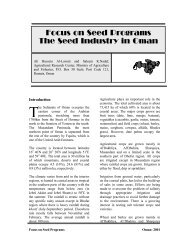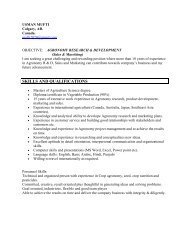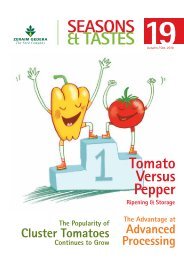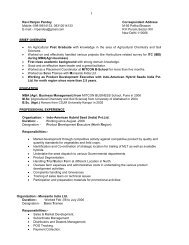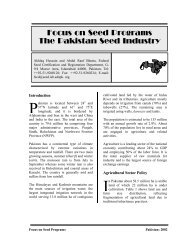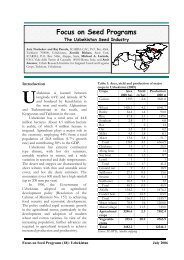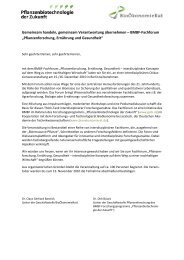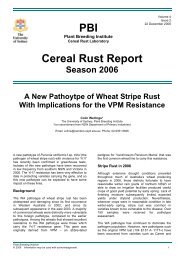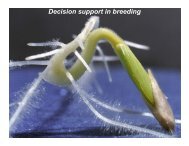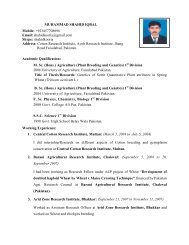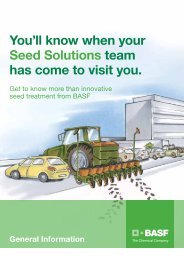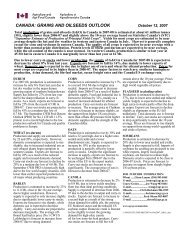The Ethiopian seed industry - SeedQuest
The Ethiopian seed industry - SeedQuest
The Ethiopian seed industry - SeedQuest
You also want an ePaper? Increase the reach of your titles
YUMPU automatically turns print PDFs into web optimized ePapers that Google loves.
6<br />
as grain color, early maturity, etc. compared<br />
to existing commercial varieties. Upon the<br />
release of the new variety breeders will<br />
provide small quantity of <strong>seed</strong> to the<br />
chairman of the NVRC who will forward it<br />
to the ICBR for the long-term storage.<br />
NSIA serves as Secretariat of the NVRC and<br />
maintains the crop variety register. Since<br />
1953, several varieties of cereals, legumes,<br />
oil<strong>seed</strong>s, fiber crops and vegetable crops<br />
have been developed and were<br />
recommended or released for use by farmers<br />
in Ethiopia (Fig 1). <strong>The</strong> list of varieties<br />
currently under production is shown in<br />
Table 2.<br />
It is believed that an independent variety<br />
evaluation agency should be established for<br />
conducting DUS and VCU tests. This has<br />
been suggested by the NVRC, but did not<br />
materialize due to certain limitations.<br />
During the past few years NSIA is building<br />
its capacity to carry out its duties and<br />
responsibilities. Efforts are being made for<br />
the establishment of an independent agency<br />
responsible for DUS and VCU tests. <strong>The</strong><br />
existing divisions/teams are upgraded to<br />
department level and additional staff<br />
recruited. Once established the independent<br />
agency conducts DUS and VCU tests and<br />
presents its findings to the NVRC for<br />
appropriate decisions.<br />
Table 2. List of crop varieties currently produced by the <strong>Ethiopian</strong> Seed Enterprise<br />
Crop<br />
Varieties<br />
Food barley<br />
Ardu-1260B, HB120, HB42, Shege<br />
Malt barley<br />
Beka, Holker<br />
Durum wheat Boohai, Foka, Kilinto<br />
ET13, Dereselegn, HAR1709, HAR710, HAR1685, K6295, HAR604,<br />
HAR1899, K6290, Pavon76, HAR1522, HAR1407, HAR1775,<br />
Bread wheat<br />
HAR1868, HAR1595<br />
Tef DZ-196, DZ-354, DZ-974, Cross 37<br />
Maize<br />
A511, Katumani, CG 4141, BH 140, BH 660, Kuleni, BH540<br />
Sorghum<br />
Birmash, Dinkmash 80, IS9302, Gambella 1107, Seredo, 76TI#23<br />
Faba bean<br />
Bulga 70, Mesay, CS 20 DK, Tesfa<br />
Field pea<br />
Markos, Hasabe, Mohanderfer, Tegegnech<br />
Chickpea<br />
Akaki, Worku, Mariye<br />
Lentil<br />
NEL-2704, Gudo, Adaa<br />
Haricot bean<br />
Awash, Mexican 142, Red Wolayta, Roba<br />
Soybean<br />
Clark, Coker, Crawford, Williams<br />
Niger <strong>seed</strong><br />
Este, Fogera, Kuyu<br />
Lin<strong>seed</strong> Chilalo, CI 1525, CI 1652, Belay 96<br />
Mustard<br />
Yellow Dodolla<br />
Note: EPHSI produces two maize hybrids, Ajab (30F 19) and Jabi (PHB 3253)<br />
Focus on Seed Programs<br />
2001: Ethiopia



